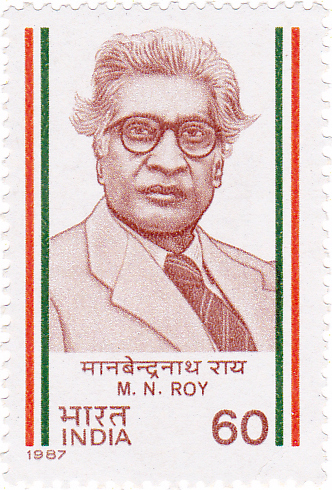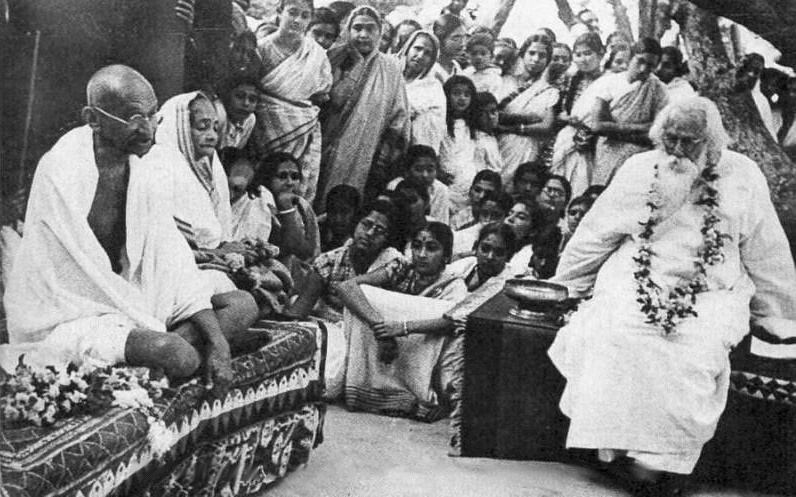|
Amlan Datta
Amlan Datta ( bn, অম্লান দত্ত) (17 June 1924 – 18 February 2010) was an Indian economist and educationist. He was pro-vice chancellor of Calcutta University and vice chancellor of North Bengal and Visva Bharti universities. Biography Amlan Datta was born Amlan Kusum Dattagupta in a Baidya family in the Comilla district of Bengal Presidency (now in Bangladesh). His parents were Ashwini Kumar Dattagupta and Sunitibala Devi. He finished his school at the Ishwar Pathshala at Comilla, took 1st class first in B.A (Hons.) in economics from the Presidency College, then affiliated with the University of Calcutta and earned a first-class fourth in MA from the same university, both with distinction. His wife Mrs Kitty Datta was a professor of English at the Scottish Church College. His eldest brother Anil Datta was University topper, and an economist, went on to become an IAS officer and was the man behind India's 1st five-year Plan. His only sister, Geeti Sen, was to ... [...More Info...] [...Related Items...] OR: [Wikipedia] [Google] [Baidu] |
The Economic Times
''The Economic Times'' is an Indian English-language business-focused daily newspaper. It is owned by The Times Group. ''The Economic Times'' began publication in 1961. As of 2012, it is the world's second-most widely read English-language business newspaper, after ''The Wall Street Journal'', with a readership of over 800,000. It is published simultaneously from 14 cities: Mumbai, Bangalore, Delhi, Chennai, Kolkata, Lucknow, Hyderabad, Jaipur, Ahmedabad, Nagpur, Chandigarh, Pune, Indore, and Bhopal. Its main content is based on the Indian economy, international finance, share prices, prices of commodities as well as other matters related to finance. This newspaper is published by Bennett, Coleman & Co. Ltd. The founding editor of the paper when it was launched in 1961 was P. S. Hariharan. The current editor of ''The Economic Times'' is Bodhisattva Ganguli. ''The Economic Times'' is sold in all major cities in India. Other ventures In June 2009, The Economic Times launched a ... [...More Info...] [...Related Items...] OR: [Wikipedia] [Google] [Baidu] |
Scottish Church College
Scottish Church College is a college affiliated by Calcutta University, India. It offers selective co-educational undergraduate and postgraduate studies and is the oldest continuously running Christian liberal arts and sciences college in Asia. It has been rated (A) by the Indian National Assessment and Accreditation Council. Students and alumni call themselves "Caledonians" in the name of the college festival, "Caledonia". Foundation The origins are traceable to the life of Alexander Duff (1806–1878), the first overseas missionary of the Church of Scotland, to India. Known initially as the ''General Assembly's Institution'', it was founded on 13 July 1830.Alexander Duff was born on 25 April 1806, in Moulin, Perthshire, located in the Scottish countryside. He attended the University of St Andrews where after graduation, he opted for a missionary life. Subsequently, he undertook his evangelical mission to India. In a voyage that involved two shipwrecks (first on the ship ... [...More Info...] [...Related Items...] OR: [Wikipedia] [Google] [Baidu] |
M N Roy
Manabendra Nath Roy (born Narendra Nath Bhattacharya, better known as M. N. Roy; 21 March 1887 – 25 January 1954) was an Indian revolutionary, radical activist and political theorist, as well as a noted philosopher in the 20th century. Roy was the founder of the Mexican Communist Party and the Communist Party of India (Tashkent group). He was also a delegate to congresses of the Communist International and Russia's aide to China. In the aftermath of World War II Roy moved away from orthodox Marxism to espouse the philosophy of radical humanism, attempting to chart a third course between liberalism and communism. Early life (1887–1910s) Early years Narendra Nath "Naren" Bhattacharya, later known as M. N. Roy, was born on 21 March 1887 at Arbelia, located in the North 24 Parganas of West Bengal, near Calcutta (Kolkata). The Bhattacharyas were Sakta Brahmins – a family of hereditary priests.Ray, ''In Freedom's Quest,'' vol. 1, p. 14. Naren's paternal grandfather was ... [...More Info...] [...Related Items...] OR: [Wikipedia] [Google] [Baidu] |
Humanism
Humanism is a philosophical stance that emphasizes the individual and social potential and agency of human beings. It considers human beings the starting point for serious moral and philosophical inquiry. The meaning of the term "humanism" has changed according to the successive intellectual movements that have identified with it. During the Italian Renaissance, ancient works inspired scholars in various Italian cities, giving rise to a movement now called Renaissance humanism. With Enlightenment, humanistic values were re-enforced by the advances in science and technology, giving confidence to humans in their exploration of the world. By the early 20th century, organizations solely dedicated to humanism flourished in Europe and the United States, and have since expanded all over the globe. In the current day, the term generally refers to a focus on human well-being and advocates for human freedom, autonomy, and progress. It views humanity as responsible for the promotio ... [...More Info...] [...Related Items...] OR: [Wikipedia] [Google] [Baidu] |
Dogmatism
Dogma is a belief or set of beliefs that is accepted by the members of a group without being questioned or doubted. It may be in the form of an official system of principles or doctrines of a religion, such as Roman Catholicism, Judaism, Islam or Protestantism, as well as the positions of a philosopher or of a philosophical school such as positivism, postmodernism, egalitarianism, and dark enlightenment. It may also be found in political belief-systems, such as Marxism, communism, capitalism, progressivism, liberalism, conservatism, and fascism. In the pejorative sense, dogma refers to enforced decisions, such as those of aggressive political interests or authorities. More generally, it is applied to some strong belief which its adherents are not willing to discuss rationally. This attitude is named as a dogmatic one, or as dogmatism; and is often used to refer to matters related to religion, but is not limited to theistic attitudes alone and is often used with respect to politi ... [...More Info...] [...Related Items...] OR: [Wikipedia] [Google] [Baidu] |
Parochialism
Parochialism is the state of mind, whereby one focuses on small sections of an issue rather than considering its wider context. More generally, it consists of being narrow in scope. In that respect, it is a synonym of "provincialism". It may, particularly when used pejoratively, be contrasted to cosmopolitanism. The term insularity (related to an island) may be similarly used to connote limited exposure. Parish order The term originates from the idea of a parish (Late Latin: ''parochia''), one of the smaller divisions within many Christian churches such as the Catholic, Eastern Orthodox, and Anglican churches. Events, groups and decisions within a parish are based ''locally'' — sometimes taking little heed of what is going on in the wider Church. A parish can sometimes be excessively focused on the local scale (thus within a particular point of view), by having (too) little contact with the broader outside, showing meager interest for and possibly knowledge about the universal ... [...More Info...] [...Related Items...] OR: [Wikipedia] [Google] [Baidu] |
Materialist Dialectics
Dialectical materialism is a philosophy of science, history, and nature developed in Europe and based on the writings of Karl Marx and Friedrich Engels. Marxist dialectics, as a materialist philosophy, emphasizes the importance of real-world conditions and the presence of contradictions within things, in relation to but not limited to class, labor, and socioeconomic interactions. This is in contrast to the idealist Hegelian dialectic, which emphasizes the observation that contradictions in material phenomena could be resolved by analyzing them and synthesizing a solution whilst retaining their essence. Marx supposed that the most effective solution to the problems caused by said contradictory phenomena was to address and rearrange the systems of social organization at the root of the problems. Dialectical materialism accepts the evolution of the natural world and the emergence of new qualities of being at new stages of evolution. As Z. A. Jordan noted, "Engels made constant use o ... [...More Info...] [...Related Items...] OR: [Wikipedia] [Google] [Baidu] |
Gandhism
Gandhism is a body of ideas that describes the inspiration, vision, and the life work of M.K. Gandhi. It is particularly associated with his contributions to the idea of nonviolent resistance, sometimes also called civil resistance. The term "Gandhism" also encompasses what Gandhi's ideas, words, and actions mean to people around the world and how they used them for guidance in building their own future. Gandhism also permeates into the realm of the individual human being, non-political and non-social. A Gandhian can mean either an individual who follows, or a specific philosophy which is attributed to, Gandhism. However, Gandhi did not approve of the term 'Gandhism'. As he explained: In the absence of a "Gandhism" approved by Gandhi himself, there is a school of thought that one has to derive what Gandhism stands for, from his life and works. One such deduction is a philosophy based on "truth" and "non-violence" in the following sense. First, one should acknowledge and acce ... [...More Info...] [...Related Items...] OR: [Wikipedia] [Google] [Baidu] |
Banaras Hindu University
Banaras Hindu University (BHU) IAST: kāśī hindū viśvavidyālaya IPA: /kaːʃiː hɪnd̪uː ʋɪʃwəʋid̪jaːləj/), is a collegiate, central, and research university located in Varanasi, Uttar Pradesh, India, and founded in 1916. The university incorporated the Central Hindu College, founded by Indian Home Rule-leaguer and Theosophist, Annie Besant in 1898. After Besant and her associates were marginalized, the university was established by Madan Mohan Malaviya with the financial support of the maharaja of Dharbhanga Rameshwar Singh, the maharaja of Benares Prabhu Narayan Singh, and the lawyer Sunder Lal. With over 30,000 students, and 18,000 residing on campus, BHU is the largest residential university in Asia. The university is one of the eight public institutions declared as an Institute of Eminence by the Government of India. BHU has often been referred by different names throughout the history and present. Some of the English names include Banaras Univers ... [...More Info...] [...Related Items...] OR: [Wikipedia] [Google] [Baidu] |
Santiniketan
Santiniketan is a neighbourhood of Bolpur town in the Bolpur subdivision of Birbhum district in West Bengal, India, approximately 152 km north of Kolkata. It was established by Maharshi Devendranath Tagore, and later expanded by his son, Rabindranath Tagore whose vision became what is now a university town with the creation of Visva-Bharati.Pearson, WW.: ''Santiniketan Bolpur School of Rabindranath Tagore'', illustrations by Mukul Dey, The Macmillan Company, 1916 History In 1863, Debendranath Tagore took on permanent lease of land, with two ( Alstonia scholaris) trees, at an annual payment of Rs. 5, from Bhuban Mohan Sinha, the talukdar of Raipur, Birbhum. He built a guest house there and named it ''Shantiniketan'' (the abode of peace). Gradually, the whole area came to be known as Shantiniketan.Basak, Tapan Kumar, ''Rabindranath-Santiniketan-Sriniketan (An Introduction)'', p. 2, B.B.Publication Binoy Ghosh says that Bolpur was a small place in the middle of the 19th ... [...More Info...] [...Related Items...] OR: [Wikipedia] [Google] [Baidu] |
Visva-Bharati University
Visva-Bharati () is a public central university and an Institution of National Importance located in Shantiniketan, West Bengal, India. It was founded by Rabindranath Tagore who called it ''Visva-Bharati'', which means the communion of the world with India. Until independence it was a college. Soon after independence, the institution was given the status of a central university in 1951 by an act of the Parliament. Overview ''The Hindu'' writes, "Santiniketan in many ways is still quite different compared to other universities in the country. Located at Bolpur in Birbhum district of West Bengal, the university still has the rural trappings that Tagore dreamt of. The classes are still held in the open under the shade of huge mango trees and students and tutors alike still travel by cycles to keep pollution at bay. The old buildings, even those that were made up of mud walls and thatched roofs, are still intact and find a place within the main campus. While some are preserved fo ... [...More Info...] [...Related Items...] OR: [Wikipedia] [Google] [Baidu] |





